With $1,000 knocked off the asking price, you're not going to find a cheaper Black Friday RTX 4090 gaming PC than this Alienware rig
A semi-affordable 4090 gaming PC! Yay! It's an Alienware! Yugh?

Alienware R16 | Core i9 14900KF | RTX 4090 | 64 GB DDR5-5200 | 2 TB SSD | $3,999.99 $2,999.99 at Dell (save $1,000)
Yes, it's an Alienware gaming PC. That normally means paying a whole lot more than necessary for the same hardware in another system but Dell's nicely chopped $1,000 off the asking price. It's certainly the cheapest RTX 4090 gaming PC I've found in the Black Friday sales so far.
Let me get this out of the way from the get-go. Alienware PC's aren't bad gaming rigs. They do come with some important caveats, which I'll address shortly, but you're getting decent gaming hardware. In this case, it's a Core i9 14900KF and GeForce RTX 4090 combination, so it'll handle any game you care to throw at it.
The main problem with Alienware gaming PCs is the price. They're normally very expensive, far more so than they really should be, but Dell's done the right thing here and hacked $1,000 off the price tag.
👉 We're curating the best Black Friday PC gaming deals right here 👈
You're still looking at a buck shy of $3,000 of course but it's an RTX 4090 rig. They're all massively expensive and it just so happens that this one is the cheapest I've seen in all the Black Friday gaming PC deals so far. And given how difficult it is to find an RTX 4090 graphics card by itself (unless you go with a Newegg combo deal), then I'd certainly recommend considering this Alienware R16 if you were dead set on getting yourself some RTX 4090 glory.
Before you rush off and spend your hard-earned cash, though, there are a few things to bear in mind. First of all, Dell's fondness for using proprietary hardware in its gaming PCs. Unlike most system integrators (SIs), Dell uses its own motherboards and chassis design, and that often means a whole heap of proprietary connectors to deal with.
Fine if you never want to fiddle about and upgrade the PC, but you're likely to bang your head in frustration if you want to change the cooler, for example.
And speaking of coolers, Dell uses an Alienware-branded 240 mm AIO liquid cooler for the Core i9 14900KF. Intel's most power-hungry chip really needs something more substantial to reign in its temperatures under load. That or you hop into the motherboard BIOS and lower the power limits. That's easy to do on a normal motherboard, far less so with a proprietary one.
Rather than having an open-front case, Dell uses one with a gap along the edge, and as we discovered when we reviewed an RTX 4080 version of the Alienware Aurora R16, it's not really enough to ensure good airflow. The upshot of this restriction and the relatively small cooler is that the CPU can't reach its full potential.
The same is true of the RAM that Dell has fitted to this version. You get a huge amount, 64 GB in total, but it's rated at DDR5-5200 which is disappointing for a cutting-edge gaming PC. You might be able to swap it out for a faster set but there's no guarantee you'll be able to enable the relative XMP mode in the BIOS.
At least the storage is decent enough, with a 2 TB NVMe SSD as standard and room to fit another gaming solid state drive. Note that because the motherboard isn't standard, the M.2 slots are actually right next to the RAM slots.
I kind of miss the old days of Alienware's bonkers PC case designs but this one is quite classy and not enormous in size, either. So if you really, really must have a new RTX 4090 gaming PC, the cheapest way to get one is this Alienware Aurora R16, warts and all.
Keep up to date with the most important stories and the best deals, as picked by the PC Gamer team.

Nick, gaming, and computers all first met in 1981, with the love affair starting on a Sinclair ZX81 in kit form and a book on ZX Basic. He ended up becoming a physics and IT teacher, but by the late 1990s decided it was time to cut his teeth writing for a long defunct UK tech site. He went on to do the same at Madonion, helping to write the help files for 3DMark and PCMark. After a short stint working at Beyond3D.com, Nick joined Futuremark (MadOnion rebranded) full-time, as editor-in-chief for its gaming and hardware section, YouGamers. After the site shutdown, he became an engineering and computing lecturer for many years, but missed the writing bug. Cue four years at TechSpot.com and over 100 long articles on anything and everything. He freely admits to being far too obsessed with GPUs and open world grindy RPGs, but who isn't these days?


